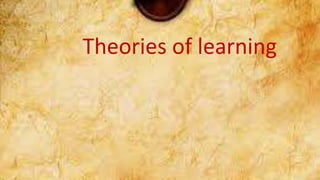
Theories of learning
- 2. Learning • Learning can be defined as any relatively permanent change in behaviour that occurs as a result of practice or experience.
- 3. Three important elements of learning • Learning is a change in behaviour, for better or worse. • Changes due to growth and maturation are not learning. • The change must be relatively permanent.
- 5. Classical conditioning • Classical conditioning is the kind of learning situation that existed in the early classical experiments of IVAN P. PAVLOV
- 6. Ivan Pavlov (1849-1936) • The researcher with which classical conditioning is most often associated is Ivan Pavlov. In fact, classical conditioning is sometimes referred to as “Pavlovian conditioning “ • Famous Russian physiologist in the late 1890s • Classical conditioning is sometimes called as respondent conditioning
- 7. Definition • Classical conditioning (also known as Pavlovian or respondent conditioning) is a learning process in which an innate response to a potent stimulus comes to be elicited in response to a previously neutral stimulus; this is achieved by repeated pairings of the neutral stimulus with the potent stimulus
- 8. Learning of conditioned responses
- 9. Learning of conditioned responses. Important terms • Stimulus – Anything in the environment that can be detected by senses
- 10. Unconditioned stimulus. • Unconditioned stimulus (US)- A stimulus that elicits an unconditioned response; for example, food is an unconditioned stimulus for a hungry animal, and salivation is the unconditioned response.
- 11. Unconditioned response • Unconditioned response (UR) - The response that reliably follows the unconditioned stimulus is known as the unconditioned response.
- 12. Conditioned stimulus • Conditioned stimulus (CS) – It is also called as neutral stimulus because except for an alerting, or an attentional, response the first few times it is presented, it does not evoke a specific response.
- 13. Conditioned response. • Conditioned response (CR)- The response that is learned in classical conditioning is termed as conditioned response (CR).
- 14. Theories about classical conditioning • Theories about classical conditioning try to describe the order to the result of the many, many conditioning that have been done. • They speculate about the nature of learning that takes place in classical conditioning.
- 15. Theories of classical conditioning. • The theories are as follows: 1. Stimulus substitution. 2. Information and expectation
- 16. Stimulus substitution • This theory, which originated with Pavlov and was influential for many years, on the idea that the CS, simply as a result of pairing with the US, acquires the capacity to substitute for the US in evoking a response. • An association- a link or a bond- is formed between the CS and the US so that the CS becomes the equivalent of the US is eliciting a response. • Two areas of the brain, one for the CS and one for the US, became activated during the conditioning procedure and that activation of the US area resulted in a reflex, or automatic, response. As a result of the CS-US pairings during the conditioning procedure, he theorised, the CS acquired the ability to excite the US area, thus leading to the reflex response
- 17. Information and Expectation • A number of experiments have a led to the view that this happens because the US is a surprising event • The US induces the learner to look back through recent memory • The CS is the event consistently found in memory on each trail before the US. • An association, or link, is thus said to be formed between the memory trace of the CS and the US. • Now when the CS occurs, the US is expected. The conditioned response is made in anticipation of the US. The form of the conditioned response often indicates that the learner expects the US.
- 18. Significance of classical conditioning • Many of the subjective feelings- violent emotions to subtle nuances of our moods-are probably conditioned responses. A face, a scene or a voice may be the conditioned stimulus for an emotional response. But we are not always able to identify the origins of our emotions. • Since the emotional response to stimuli are learned, perhaps they can be unlearned. Or perhaps other, less disturbing responses can be associated with the stimuli that produce unpleasant emotional responses. • The extinction and alteration of disturbing emotional responses by classical conditioning is one form of behaviour therapy.
- 19. Application • Something Good can start or be presented, so behavior increases = Positive Reinforcement (R+) • Something Good can end or be taken away, so behavior decreases = Negative Punishment (P-) • Something Bad can start or be presented, so behavior decreases = Positive Punishment (P+) • Something Bad can end or be taken away, so behavior increases = Negative Reinforcement (R-)
- 20. References • Introduction to Psychology------ Tata McGraw Hill edition • Wikipedia the free encyclopedia. • Chance------ Paul. Learning and Behavior. Belmont
- 21. THANK YOU